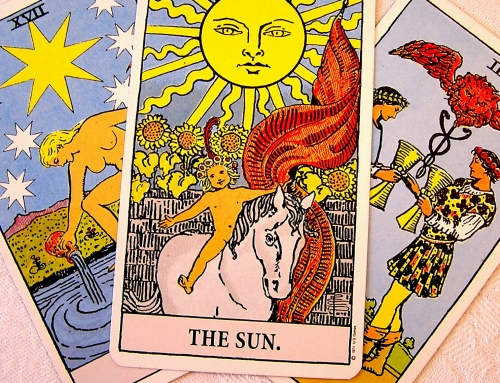Are our lives fated from the moment we take our first breath or do we create our destinies through our decisions and actions? There are basically three different approaches to fate, so which approach do you take in life?
Fatalism. Ancient studies of astrology, palmistry and mysticism have long maintained that each individual is fated to walk a particular path in life and that many of our successes and sorrows are written long before we encounter them. Like a droplet in an ocean, we are part of a greater scheme, often unseen as we focus on our own lives and circumstances.
Free-will. If fate is such a powerful force in shaping our destinies, why then does the world seem to belong to people who plan, work hard and seize the day when opportunities arise? Believers in free-will argue that there is no destiny ahead except that which you forge with your own hands. They believe that opportunities are not to be waited for but need to be created. Men and women with imagination see beyond their surroundings, to what is possible and think that genius lies in the toil required to make their dreams into reality.
A combination of fate and free-will. What about the possibility of a combination of fate and free will? This includes waiting for opportunities to arrive and then shaping them into tangible objects or goals. It has been said that luck is where preparation meets opportunity but this combination goes one step further. It includes the possibility of predicting when an opportunity will arrive and preparing to seize it with both hands.
Recently a client asked about a love relationship that was exhausting her. Brenda was pining for Geoff, who didn’t seem to feel the same way about her. It was an example of the right people in the wrong circumstances. Geoff wasn’t ready for the deep, committed relationship that Brenda wanted and at 38 years of age, she felt that her chance to start a family was diminishing.
To clarify her long-term relationship opportunities I looked ahead ten years, to see two different paths in life, depending on her choices in the next 12 months. If she was to pursue a relationship with Geoff, at age 48 she’d have an eight year old son who looked identical to Geoff, but Geoff was no longer a part of her life. It seemed difficult having a son who was a daily reminder of the man who was no longer her partner.
The second possible path involved a more conservative looking man with short strawberry blonde hair and a suburban home with a neat front and back garden. This path offered Brenda two children, a boy and a girl. She was still pursuing her fashion career, travelling interstate twice a month and enjoying city life and domestic tranquillity.
As she sat before me Brenda wasn’t interested in pursuing a relationship with a man she hadn’t yet met. Instead she wanted to find a way to make her relationship with Geoff into the dream partnership she yearned for daily. This makes sense because Geoff is a real person and a tangible possibility whereas Mr. X is not yet visible or real; he is the stuff of dreams.
As a clairvoyant it is sometimes difficult to interest clients in possibilities outside their current vision and circumstances. When a client has someone in mind, that’s the relationship he or she wants to pursue. When I sometimes explain that what she is searching for is unlikely to be found with that particular person, she leaves feeling dejected, despite predictions of another, more suitable partner soon to arrive. Sometimes they tell me that they aren’t happy with their reading but I can’t tell them something that I cannot see for them. There are many occasions when they return and thank me at a later date, long after I’ve forgotten what I had said to them.
Sceptics sometimes argue that clairvoyants are soothsayers – telling clients what they yearn to hear. From a strictly business point of view this might be good short term practice, as clients might leave excitedly singing your praises. In the longer term however, it is poor business practice, as success depends on return business and clients eventually discover your accuracy levels.
Thinking back over my private practice since 1985 I’d have to say that in an average month I find that I’m telling up to 60% of clients about possibilities they hadn’t anticipated, don’t want and that conflict with their current plans. This isn’t to say that I’m giving them bad news but simply that I’m not telling them what they expect to hear.
If you tell a 21 year old that he won’t be a famous rock star and that instead he’ll sell his guitar and make a very comfortable, fulfilling living as an accounts manager, he’ll probably go on a drinking binge straight after the reading. Ask him again in his fifties how he feels about his career choices and he’ll nod wistfully about the dreams of his youth but recognise the wisdom of having a regular income to put his children through school and university.
Sometimes I’m faced with the onerous task of telling a client that her dreams will not be fulfilled, despite every effort. In rare instances I have no better path to predict for the client so I ask how she might map out a path towards her important goals.
Over the years I’ve accepted that not everyone who climbs career or creative mountains reaches their desired summit. Many people stop along the way, feeling satisfied with the level that they have reached. For some people, plans are soon abandoned when obstacles arise and for others, there are many sacrifices along the way in pursuit of their dreams. Relationships are lost, health suffers and financial constrictions only seem to steel their nerves and focus their ambitions.
When I sit before a client who is facing a personal winter, it is sometimes important to ask if she is content with the level she has reached in pursuit of her goals, if she is prepared to grit her teeth and plunge ahead or if it is time to make a new map to more rewarding and more accessible goals.
This map-making process is the act of using free-will to determine life direction so far as life allows at that time. Making the map is only the first step to achieving goals just as dreaming is only the first step toward being or having. It’s popular now to believe that manifesting is all that is required to ensure that you achieve your goals but while some individuals are merely dreaming of the mountain top, others are taking real steps towards reaching the summit.
When clients are open to the possibility of a different but equally rewarding future to the one anticipated I believe that they have a better chance of shaping rewarding lives for themselves. People who sit passively, accepting that what they are being told by a clairvoyant is absolute, either leave the reading feeling despondent or find another clairvoyant who predicts what they expect from life.
It might be argued that the fatalistic need more patience as they await the arrival of opportunities than those who advocate free-will. People who believe in fate need to wait for opportunities but while waiting, they can hone skills necessary to make the most of each prospect as it arrives. Individuals who believe in creating opportunities usually require more energy, confidence and persistence as they sometimes plant seeds in the heart of winter, long before nature supports the growth of those seeds.
Some people accept that particular opportunities and circumstances in life are fated while other circumstances require the use of free-will and persistence. For them, success results from being observant and knowing when to glide with life and when to push for what you want. “Trust in God and tether your camel,” is the adage here.
While fatalistic people might observe a successful person who uses his or her free-will as someone who is fated to succeed, people who are sceptical of fate often believe that fatalistic individuals are justifying their lack of success.
Sometimes, the act of parking yourself halfway up the mountain of your dreams is the result of recognising the personal cost that is likely to be extracted by pushing on to the summit. Success at any cost can be a lonely reward.
“When making money is as important to you as breathing, you’ll be wealthy” is the way a business coach recently described it. At that moment, several people attending his talk sighed and reached for their car keys.
© Copyright 2012 Paul Fenton-Smith





